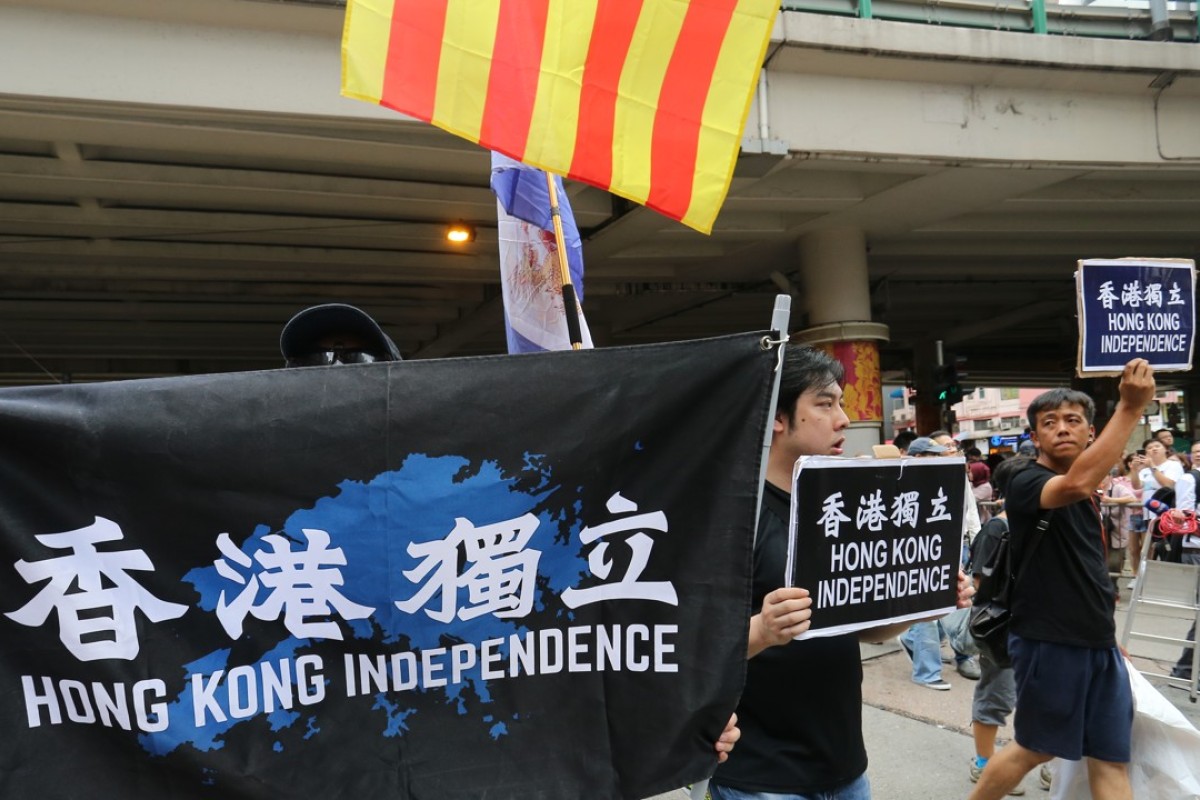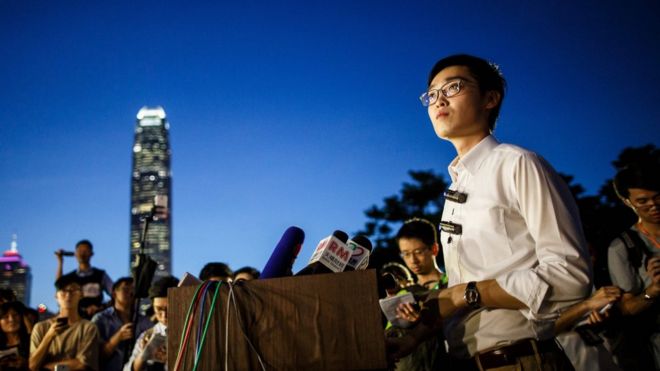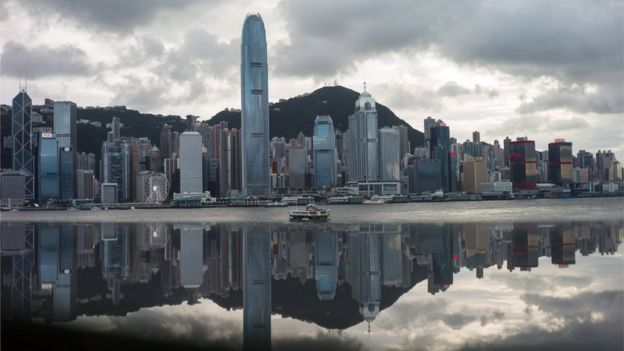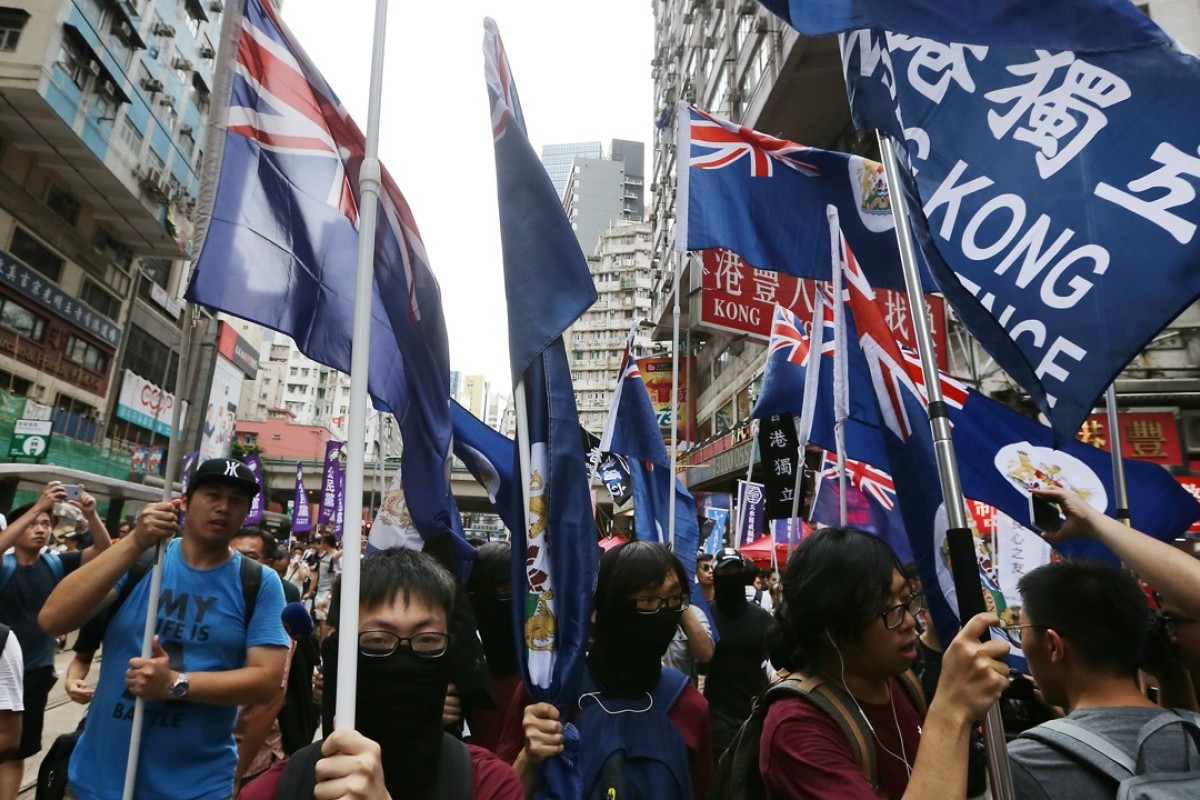By Kelly Olsen

Andy Chan Tin-ho (center), the founder of the Hong Kong National Party, is surrounded by members of the media as he leaves the Foreign Correspondents' Club in Hong Kong on August 14, 2018.
A pro-independence Hong Kong politician whose party is under threat of a ban lashed out at China in a closely watched Tuesday speech.
Andy Chan Tin-ho, a member of the Hong Kong National Party, has been at the center of controversy over free speech and Hong Kong's autonomy.
The Foreign Correspondents' Club of Hong Kong, which invited him, came under pressure itself from the central government in Beijing as well as local authorities to cancel the event.
Dozens of protesters gathered outside the club in central Hong Kong amid heavy police presence as what appeared to be mostly anti-independence demonstrators held up signs and shouted slogans.
Hong Kong enjoys rights not allowed in mainland China, such as the freedom to criticize political leaders, but the central government and local authorities has drawn a red line at calls for independence and has pressured local leaders to back that up.
In his speech, Chan said his party has been "demonized as some sort of extremist group" by China for advocating independence and that he has come under harsh surveillance by authorities.
"In reality, what the National Party is chasing after is no different from what many Hong Kongers wish for: the dream of democracy," Chan said.
Chan said that Hong Kong, with its distinctive language, culture and history, is coming under the same pressure to assimilate with the nation as minority groups in the mainland.
He cited the far western region of Xinjiang, which he referred to as East Turkestan, as well as Tibet. East Turkestan is a political term that refers to Xinjiang and was also used in an East Turkestan Republic in the 1930s.
"China is a large empire," Chan said.
Dozens of protesters gathered outside the club in central Hong Kong amid heavy police presence as what appeared to be mostly anti-independence demonstrators held up signs and shouted slogans.
Hong Kong enjoys rights not allowed in mainland China, such as the freedom to criticize political leaders, but the central government and local authorities has drawn a red line at calls for independence and has pressured local leaders to back that up.
In his speech, Chan said his party has been "demonized as some sort of extremist group" by China for advocating independence and that he has come under harsh surveillance by authorities.
"In reality, what the National Party is chasing after is no different from what many Hong Kongers wish for: the dream of democracy," Chan said.
Chan said that Hong Kong, with its distinctive language, culture and history, is coming under the same pressure to assimilate with the nation as minority groups in the mainland.
He cited the far western region of Xinjiang, which he referred to as East Turkestan, as well as Tibet. East Turkestan is a political term that refers to Xinjiang and was also used in an East Turkestan Republic in the 1930s.
"China is a large empire," Chan said.
 "If you are different, you are wrong."
"If you are different, you are wrong."Police have requested that Chan's party be banned on national security grounds and authorities are going through the process of making a decision, which includes hearing the party's defense.
'Freedom of speech'
Hong Kong is a semi-autonomous region of China that was a British colony until 1997.
Under a Sino-British accord, Hong Kong kept its legal system, currency and civic freedoms, famously guaranteed for 50 years under the "one country, two systems" formulation.
The city is a major global financial and trade center of about 7.4 million people and its combination of low regulation, free speech and rule of law have contributed to its status as a favored center for international banks and multinational companies.
The Hong Kong government immediately responded to Chan's Tuesday speech, issuing a statement condemning anyone publicly favoring independence and providing a venue to those who do, though it did not mention the politician by name.
The statement singled out the Foreign Correspondents' Club by name, saying the government "deeply regrets" the journalist organization hosting the talk.
Victor Mallet, president of the club, defended the invitation and the holding of the event on free speech grounds.
"The FCC does believe that its members and the public at large have the right ... to hear the views of different sides in any debate," he said just before Chan's speech began.
Some protesters came out to support Chan's right to speak out.
"I support freedom of speech," said a man who would only identify himself as a Hong Kong citizen named Johnny.
"China is killing this city," he added.
The city is a major global financial and trade center of about 7.4 million people and its combination of low regulation, free speech and rule of law have contributed to its status as a favored center for international banks and multinational companies.
The Hong Kong government immediately responded to Chan's Tuesday speech, issuing a statement condemning anyone publicly favoring independence and providing a venue to those who do, though it did not mention the politician by name.
The statement singled out the Foreign Correspondents' Club by name, saying the government "deeply regrets" the journalist organization hosting the talk.
Victor Mallet, president of the club, defended the invitation and the holding of the event on free speech grounds.
"The FCC does believe that its members and the public at large have the right ... to hear the views of different sides in any debate," he said just before Chan's speech began.
Some protesters came out to support Chan's right to speak out.
"I support freedom of speech," said a man who would only identify himself as a Hong Kong citizen named Johnny.
"China is killing this city," he added.


 Andy Chan says China's pressure proves that Hong Kong should go it alone
Andy Chan says China's pressure proves that Hong Kong should go it alone Hong Kong and China - one country, two systems ?
Hong Kong and China - one country, two systems ?

